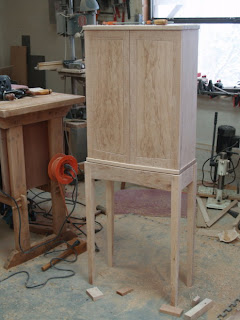 It is snowing hard outside, and blizzard conditions are predicted for this afternoon. We seem to have passed the window of bad weather that makes ice, pulls down trees and power lines. So at this point, we can settle in and enjoy. I have been taking photos of my spoon carving knives for an article in Make Magazine and plan to head for the wood shop to build a fire and warm the space for work.
It is snowing hard outside, and blizzard conditions are predicted for this afternoon. We seem to have passed the window of bad weather that makes ice, pulls down trees and power lines. So at this point, we can settle in and enjoy. I have been taking photos of my spoon carving knives for an article in Make Magazine and plan to head for the wood shop to build a fire and warm the space for work.I have been involved in s brief flurry of messages from Frank Wilson and others exploring the ways we assess performance in schooling, which often is unrelated to what children need, a way of observing, measuring and assessing their own performance. And so, I have also been reflecting on David Henry Feldman's article "the Child as Craftsman." Frank said,:
I have more and more wondered when it will be understood that the most constructive and effective assessments come from the observations of the single individual whose goal is to develop and refine his or her own message. The most serious defect in both the logic and practice of exogenous evaluations is that there can be no lasting effect on the child or student unless the goal is to make that student a skilled and committed observer of his/her own work. Every artist knows this; every teacher who understands how learning “works” knows that the only critic whose opinion counts is that of the student who has clear, personally chosen goals and the skill to direct the process. Great teachers teach their students how to pay attention to everything they are doing.My kids in the wood shop sometimes tell me "the wood doesn't like me." And I can assure them that the wood has no feelings one way or the other, but that they will have a better relationship with wood through practice and attention to its characteristics. If you look back on our history of science, The Royal Academy of Science in the UK, Jefferson and Franklin in the US, you see the close relationship between materials science and the making of things, and then the relationship between the making of things and every other facet of scientific knowledge, and then we make schools in which kids don't even make music. The sloyd educators precepts, start with the interests of the child, move from the known to the unknown, from the simple to complex, from the easy to more difficult, and from the concrete to abstract, laid out the steps for an ever expanding relationship with paying attention to everything one does.
 The photo at the top is one I took for the article in Make Magazine. I'll let you know when it is published. The photo at left shows the nearly completed Krenov inspired maple cabinet, so I am nearly finished with the 7th chapter and beginning the 8th.
The photo at the top is one I took for the article in Make Magazine. I'll let you know when it is published. The photo at left shows the nearly completed Krenov inspired maple cabinet, so I am nearly finished with the 7th chapter and beginning the 8th.
We're about to get the storm you had, and it seems like the best thing to do is to stay home and work in the shop.
ReplyDeleteMario
Mario, we were relieved to only get about 8 inches of snow on top of an inch of sleet, and it was much worse north of us. I got a bit of tractor time pushing snow on our drive while it was still warm enough to enjoy it. Tonight we expect the temperature to plummet to the below zero range. Brrr.
ReplyDelete